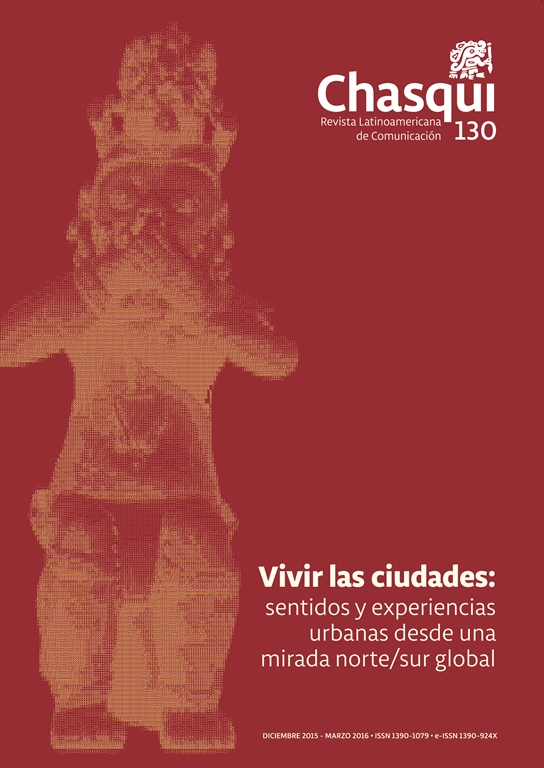The transformations of pre-olympic Rio: echoes on the soundscapes of Maré’s slum
DOI:
https://doi.org/10.16921/chasqui.v0i130.2564Keywords:
Olympic Games, ethnography, hearing, sound studiesAbstract
In this article, we explore Rio de Janeiro’s everyday urban experiences through attending to the sense of hearing. By adopting an ethnographic approach, our aim is to explore the ways in which the transformations that the city has experienced in the period that precedes the Olympic Games echo in the soundscapes of favela da Maré. In order to investigate this, we combine theoretical perspectives from the fields of sound studies and auditory culture, proposing a dialogue between cities and the senses. Our research indicates that urban sounds epitomize the joy of living, cultural richness and diversity of cities. For this reason, we suggest that the military occupation forces’ arbitrary actions in Maré manifest precisely through the suppression of sounds.References
Atkinson, P.; Delamont, S. & Housley. W. (2007). Contours of culture: Complex ethnography and the ethnography of complexity. Lanham, MD: Altamira Press.
Bull, M. & Back, L. (eds.) (2003). The Auditory culture reader. Oxford: Berg.
Carpes, G. (2013, 13 julho). RJ: Favelas pacificadas espantam bailes funk e atraem playboys. Recuperado de http://goo.gl/eUXIz.
Durán, M.A. (2008). La Ciudad compartida: Conocimiento, afecto y uso. Santiago: Ediciones Sur.
Erlmann, V. (ed) (2004). Hearing cultures: Essays on sound, listening and modernity. Oxford: Berg.
Hendy, D. (2013). Noise: A Human History of Sound and Listening. London: Profile Books.
Hilmes, M. (2005). Is there a field called sound studies? And does it matter? American Quarterly, 57(1), 249-259.
Husband, C. (2009). Between listening and understanding, Continuum: Journal of Media & Cultural Studies, 23(4), 441-443. Recuperado de http://goo.gl/h59GLR.
Laplantine, F. (1994). Aprender antropologia. São Paulo: Brasiliense.
Paiva, R. (2003). O Espírito comum: Comunidade, mídia e globalismo. Rio de Janeiro: Editora Mauad.
Pink, S. (2009). Doing Sensory Ethnography. London: Sage.
Poynter, G. & MacRury, I. (Eds) (2009). Olympic Cities: 2012 and the Remaking of London. London: Aldershot Ashgate Publishing.
Redes de Desenvolvimento da Maré, Observatório de Favelas (2011, fevereiro-março). Os Muros do Invisível: Uma Pesquisa sobre a Ação/Discurso Governamental e a Percepção dos Moradores das Favelas no Cenário dos Megaeventos no Rio de Janeiro. Recuperado de http://goo.gl/RwHbWF.
Schafer, R.M. (1997). A afinação do mundo: Uma exploração pioneira pela história passada e pelo atual estado do mais negligenciado aspecto do nosso ambiente: a paisagem sonora. São Paulo: Editora UNESP.
Sparkes, A. (2002). Autoethnography: self-indulgence or something else? Em Bochner, A. & Ellis, C. (Eds.), Ethnographically Speaking: Autoethnography, Literature and Aesthetics. Lanham: MD, Altamira Press.
Steiner, G. (1992). No Castelo do Barba Azul – algumas notas para a redefinição da cultura. Lisboa: Relógio D´Água.
UPP Governo do Rio de Janeiro (2016). O que é? (sem data) Recuperado de www.upprj.com/index.php/o_que_e_upp. Acesso em 18 de abril 2016.
Valente, J. L. (2014). UPPs: Observações Sobre a Gestão Militarizada de Territórios Desiguais. Revista Direito e Práxis 5(9), 207-225. Recuperado de http://goo.gl/XMRH7g.
Downloads
Published
Issue
Section
License
- Authors retain copyright and grant the journal right of first publication with the work simultaneously licensed under a Creative Commons Attribution-NoDerivs License (CC BY-ND) that allows others to share the work with an acknowledgement of the work's authorship and initial publication in this journal.
- Authors are able to enter into separate, additional contractual arrangements for the non-exclusive distribution of the journal's published version of the work (e.g., post it to an institutional repository or publish it in a book), with an acknowledgement of its initial publication in this journal.
- Authors are permitted and encouraged to post their work online.

